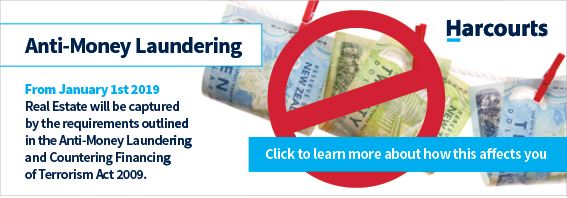Anti-Money Laundering Implications

From 1 January 2019 Real Estate agents will, among other things, be required to verify the identity of their clients in accordance with AML/CFT legislation. This is called Customer Due Diligence (CDD).
This means they are required to identify who their clients are (i.e. who they are acting for). This could be individuals, companies, trusts, or other client types like societies and government departments etc. This means asking for information to verify your full name, date of birth, and residential address. This can be done in several ways but, not unlike the banks, they will ask to see identity documents like your Passport, Driver Licence, utility bill etc. In some cases, they have obligations to establish source of funds and wealth.
All real estate agents in New Zealand have legal obligations to comply with the AML/CFT legislation and will be requesting more documents and information than they have in the past.
Please show some understanding as these are new procedures and obligations that have been introduced into the real estate sector. This is a major change for the industry.
If your real estate agent cannot verify your identity in line with the legislation, they may not be able to act for you. More information about CDD is outlined below.
Please note – If you are purchasing property you are not deemed a client of the real estate company (unless you have engaged them as a buyer’s agent) however, your lawyer also has AML/CFT obligations and may need to complete CDD. We encourage all purchasers to engage early with lawyers in any sale or purchase process. See ‘Documentation you may be asked for’ below for an outline of the things that may be requested.
Who do Real Estate agents need to complete CDD on?
They must identify and verify:
- the client;
- each beneficial owner of the client; and
- each person acting on behalf of the client including the authority to act on behalf of the client e.g. a lawyer or representative giving instructions on someone’s behalf.
What is a beneficial owner?
A beneficial owner is any individual (natural person) who satisfies one or more of following:
- the individual has effective control of the client; or
- the individual is a person on whose behalf a transaction is conducted;
- the individual owns more than 25% of the client or person on whose behalf a transaction is conducted (e.g. direct/indirect shareholders).
What is effective control?
Effective control is the ability to exercise control or influence over a company or entity. Typically, this will be the directors of a company or entity or those who hold senior positions. It could also be those who are funding the company, so this is something else that you will need to consider, and where relevant, enquire about.
What information will they need to get?
As a starting point, the following identity information must be obtained:
- the person’s full name;
- the person’s date of birth;
- if the person is not the client, the person’s relationship to the client;
- any additional information prescribed by regulations.
This can be done several ways but not unlike the banks, they will ask to see your identity documents like your Passport, Driver Licence, utility bill etc.
What is the nature and purpose of the business relationship?
Your real estate agent is also required to get information on the nature and purpose of the proposed business relationship with you. This includes understanding what you are trying to achieve, how much business is expected, and how regular your interactions will be.
Source of funds/wealth:
In some cases the Real Estate agent will need to establish the source of the funds for the transaction (i.e. where the funds have actually come from) and source of wealth (i.e. how those funds got there in the first place and how was that money obtained)
Documentation you may be asked for:
The below gives an indication of some of the documents your real estate agent may ask you to present in person or as certified documents as part of this process:
Individuals:
Passport, NZ Firearms Licence or NZ Driver Licence with another document such as a bank statement or statement issued by a Government agency. You will also need to provide a document with your residential address (for example, a utility bill)
Trusts:
The Trust Deed and, for trustees, and settlors, the information required for individuals as noted above, together with information regarding the Trust’s source of funds or wealth. Additional information may also be required for beneficiaries. Information regarding source of funds or wealth may also be required.
Companies:
Details of the company, together with the information for individuals noted above for every individual with more than a 25% shareholding, all individuals with effective control of the company and all individuals acting on behalf of the company. Information regarding source of funds or wealth may also be required.
The above list is not exhaustive and is indicative only. Your real estate agent will assist you with the specific requirements in relation to your situation.
The information you are asked to provide will vary depending on whether you are doing business as an individual or part of a partnership, company, public body, estate or trust.
Businesses are not doing this because they think you are laundering money – they are doing it to help protect everyone and because they are required to under the law.
Copy supplied by AML Solutions.
Client Advisory - Anti-Money Laundering

The Anti-Money Laundering and Countering Financing of Terrorism Act 2009 (the Act) has applied to financial institutions and casinos in New Zealand since 2013.The Act is designed to prevent money obtained through illegal means from entering the New Zealand financial system to be “laundered”. Although New Zealand is considered to be a relatively clean market it currently falls prey to an estimated $1.35b in money laundering activities each year.
Since 2013, other non-financial businesses and professions have been captured by the act. Lawyers and Conveyancers and some businesses forming trusts have had to comply since 1 July 2018 and Accountants from 1 October 2018.
From 1 January 2019 entities carrying out Real Estate activities will be required to:
- have appointed a compliance officer;
- have assessed and documented the money laundering and terrorist financing risks the business faces;
- have established a programme to detect and manage any risks identified; and undertake a number of other specific tasks, including but not limited to performing customer due diligence when they enter a relationship with their customers (or vendors as described by the Real Estate Agents Act 2008).
At its core, Real Estate Agents need to identify who their customers (vendors) are and this is required before the agency work commences. When the property is in the name of an individual, proof of identity is relatively simple to collect and is straight forward.
For properties that are held in companies, trusts or a combination of both, a more enhanced suite of requirements for due diligence is required. Where the Real Estate Agent cannot perform the prescribed level of due diligence, then the customer must not be onboarded and the listing cannot be accepted.
Following the inclusion of Lawyers and Conveyancers from July 1, property transactions have already been captured under Anti-Money Laundering/Countering Finance of Tourism legislation. From this date members of the legal profession are required to perform to the same compliance regime and perform the same levels of due diligence as mentioned above to the buyers of property.
Fast forward to 1 January 2019, due diligence will be required to be performed on the buyers and sellers of property. This will result in property transactions, particularly commercial property which often involves complex ownership structures, to become more onerous to navigate and more time consuming.
In the meantime, it is important real estate agents have systems in place by 1 January 2019 to ensure compliance with the obligations imposed them. Additionally, buyers and sellers of property, especially commercial property need to fully appreciate the new requirements of this Act and the impact it will have on their businesses.
Crombie Lockwood has worked through the process of obtaining cover under the Act for Solicitors and Accountants. Most insurers have provided some sub-limited cover for defence costs and civil pecuniary penalties arising from an alleged breach of the obligations imposed by the legislation. We will be looking to obtain similar cover for Real Estate Agents ahead of the compliance date of 1 January 2019.
What you need to know about the Overseas Investment Act changes?

How do the changes to the Overseas Investment Act affect me?
The implications of the Overseas Investment Amendment Act 2018 (“Act”) have been widely discussed and, in particular, its effect on ‘overseas persons’ acquiring residential property in New Zealand. As of 22 October 2018, new laws prevent certain overseas persons from acquiring residential property in New Zealand.
The Act will not apply to transactions entered into before 22 October 2018.
Residential Land
The new laws apply to land that is categorised as ‘residential’ or ‘lifestyle’ under the District Valuation Roll.
Overseas Persons
An ‘overseas person’ means a person who is neither a New Zealand citizen nor ‘ordinarily resident in New Zealand’. A person is ‘ordinarily resident in New Zealand’ if they:
- hold a residence class visa; and
- have lived in New Zealand for the last 12 months; and
- have been present in New Zealand for at least 183 days in the last 12 months; and
- are a New Zealand tax resident.
The restrictions do not apply to citizens or permanent residents of Australia or Singapore who live in New Zealand.

Overseas Investment Office Consent
The new laws are not a complete ban on overseas persons acquiring residential property in New Zealand, but (subject to certain exemptions) such acquisitions will now require the consent of the Overseas Investment Office (“OIO”).
There are some exemptions from the requirement to obtain OIO consent, such as if an overseas person acquires an apartment ‘off the plan’ within a multi-storey development of 20 or more apartments. Developers of these properties can apply to the OIO for an exemption to sell a certain percentage of such properties to overseas purchasers.
Eligibility Statement
Another change under the new laws is that every person acquiring residential land will be required to complete a Residential Land Statement form which can be provided by a conveyancer (usually a lawyer). It is an offence to make a false or misleading statement and the penalties are significant.
The magic word that separates dud buys from dream buys
If you’re buying a home, why not buy one with “potential”.
“Potential” can mean many things in houses for sale. That can mean “potential” to create the perfect home, or “potential” to add value and climb the property ladder. It could mean “potential” as a suburb gentrifies or the local school goes up in desirability.
It could also mean “potential” to earn an income from a “home and income” property that comes with a legal flat, a self-contained guest suite or room in the home that can be let to flatmates, boarders, international students or Airbnb guests.
Sometimes the potential isn’t always obvious. You may even need a good surveyor or architect to really identify the potential.

Write down what you’re looking for to create a shopping list. Then set up a saved search that isn’t too specific.
Doing the numbers
The dream and reality of potential are two different things. Do-ups can be money pits so you need to do the numbers. What will it cost to buy, how much will the work cost and how much you can realistically sell for afterwards if it’s a quick flick. It’s a good idea to become a spreadsheet ninja and/or get professional input from architects, surveyors, quantity surveyors and others. The more time you do planning the less trouble and cost you’ll encounter.
Do-ups
Do-ups are as Kiwi as paua and pav. Many young couples jump a couple of rungs on the property ladder thanks to putting in blood, sweat, tears and money to turn around a rough diamond into home magazine tucker.
Property investors and traders have taken the do-up to the next level. They know that a clever renovation will a: allow them to have the property revalued and release capital for their next purchase, b: command more rent increasing their yield on a rental property, and c: ultimately result in capital gain. Traders are looking for quick flips and/or cheap improvements that pay handsome dividends.
They look for:
• Sections that can be subdivided
• Walls that can be moved added to increase the number of bedrooms.
• Easily added en-suites. One bathroom just doesn’t cut it these days for many buyers.
• Kitchens and laundries that can be converted to bedrooms. .
• Basement conversions.
Worst house in the best street and school zones
If it’s an owner occupied property you’re looking for, the potential may be in buying the worst house in the best street or school zone. If you can get your children into a good school then it could be well worthwhile spending time and money on doing a less than desirable home up.
Watch the markets
Do your homework and know your market so you can spot bargains. Whatever you do keep a beady eye on properties for sale as they’re listed.
One buyer’s problem can be another buyer’s potential. So look long and hard at properties that don’t sell instantly. If you can solve the problem that turns others off buying, you might be able to buy cheaply.
